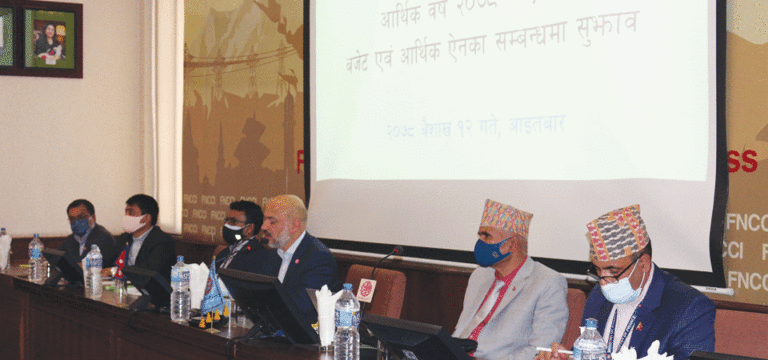
Federation of Nepalese Chambers of Commerce and Industry (FNCCI) has suggested the government to maintain the rate of value added tax (VAT) at 10 per cent in the upcoming budget.
On Sunday, the FNCCI organised a discussion programme on the upcoming budget and the Finance Act and suggested that the VAT rate should be reduced to 10 per cent from existing 13 per cent.
The FNCCI has suggested that the VAT on diesel and LP gas should be credited, and that the rates of excise duty on all items except for tobacco and alcohol and vehicles, which have a direct adverse effect on health, should be gradually reduced to zero within three years.
The provision of deducting 50 per cent of the tax imposed on the contract of construction and supply of goods with the government body should be ended.
Presenting the suggestions, FNCCI President Shekhar Golchha said that a provision should be made for the industries producing goods exempted from value added tax to voluntarily register for value added tax at zero rate.
In addition, value added tax should not be charged on the purchase of raw materials and subsidiary raw materials used in the pharmaceutical industry in Nepal.
He said that real estate and housing sector should be recognised as an industry. The private sector should be involved in the construction of low cost housing to provide comfortable and safe housing facilities to the homeless Nepali citizens, he said.
The FNCCI has also suggested increasing the limit of income tax exemption.
The federation has suggested raising the personal income tax exemption limit to Rs. 700,000 for individuals and Rs. 800,000 for couples.
At present, there are Rs. 400,000 slabs for individuals and Rs. 450,000 for couples.
The Federation has also suggested changing the current slab of wage income tax to 5, 15 and 25 per cent and to reduce the existing 30 per cent tax rate in the banking and financial sectors.
The FNCCI has suggested the government to introduce budget giving priority to COVID-19 control and health care expansion.
The government should emphasize on effective relief and rehabilitation programme and restricting of agriculture ecosystem, technology and good governance in public sector, infrastructure development and private sector incentive special programme in the next fiscal year’s budget.
Golchha said that the government should construct the isolation with minimum facilities by identifying suitable places at local levels, quarantine, emergency room and temporary hospitals.
“It is a must to vaccinate as many as possible by bringing more vaccines from the countries, like India through diplomatic initiative,” he said.
The FNCCI asked the government to extend the announced facilities, including banking to COVID-affected small, cottage and small scale industries, tourism, entertainment, public transportation, film industry, handicraft, readymade garments, textiles, private schools, health centres, hydropower projects under construction and export industries for at least two years.
The loan rescheduling and restructuring period should be extended for one more year, it said.
The industrial zones declared at the provinces should be brought into operation from the next fiscal year 2021/22.
A powerful independent regulatory and promotion body should be established to promote special economic zones, industrial zones, export processing zones and IT parks.
Source : THE RISING NEPAL,






